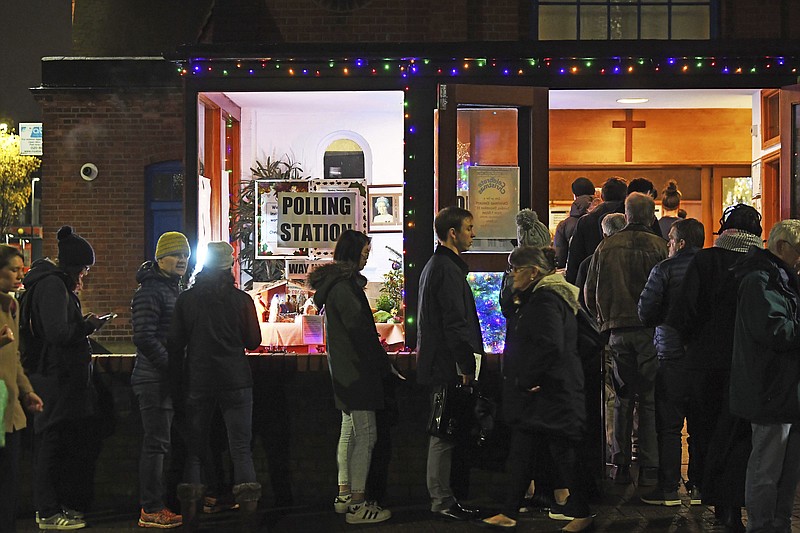LONDON (AP) — An exit poll in Britain’s election projects that Prime Minister Boris Johnson’s Conservative Party will likely win a majority of seats in Parliament, an outcome that would allow Johnson to fulfill his plan to take the U.K. out of the European Union next month.
The survey predicts the Conservatives will get 368 of the 650 House of Commons seats and the Labour Party 191. It projects 55 for the Scottish National Party and 13 for the Liberal Democrats. Based on interviews with voters leaving 144 polling stations across the country, the poll is conducted for a consortium of U.K. broadcasters and regarded as a reliable, though not exact, indicator of the likely result.
Britons who have endured more than three years of wrangling over their country’s messy divorce from the European Union cast ballots Thursday in an election billed as a way out of the Brexit stalemate in this deeply divided nation.
On a dank, gray day with outbreaks of blustery rain, voters went to polling stations in schools, community centers, pubs and town halls after a five-week campaign rife with mudslinging and misinformation.
The contest pits Conservative Prime Minister Boris Johnson, who said he will take Britain out of the European Union by Jan. 31, against the opposition Labour Party led by Jeremy Corbyn, who has promised another referendum on Brexit.
All 650 seats in the House of Commons are up for grabs in the election that is being held more than two years ahead of schedule. Opinion polls suggest the Conservatives have a lead over Labour. However, all the parties are nervous about the verdict of a volatile electorate fed up after years of Brexit wrangling.
At a fish market in the eastern England port of Grimsby, seafood company owner Nathan Godley summed up the hopes of many that — one way or another — the election would provide a pathway to a resolution of Brexit.
“I think we all got a bit weary of the politicians over the last few years really, and I think having a government with a majority to give them the clout to actually do what they want is a good thing,” he said.
Johnson voted near the prime minister’s Downing Street residence in London, accompanied by his dog, Dilyn. Corbyn was greeted by supporters and an activist dressed as Elmo from “Sesame Street”as he arrived to vote in his north London constituency.
The two parties are offering voters starkly different visions of the future. Johnson campaigned relentlessly on a promise to “Get Brexit done” — and promised a modest increase in public spending — while Labour vowed to tax the rich, nationalize industries such as railroads and water companies and give everyone in the country free internet access.
On Brexit, Labour said it will negotiate a new divorce deal with the EU and then offer voters the choice of leaving the 28-nation bloc on those terms or remaining.
The prime minister pushed for this early election to try to break a logjam in Parliament that stalled approval of his Brexit agreement. He said if he wins a majority, he will get Parliament to ratify his “oven-ready” divorce deal with the EU and take Britain out of the bloc as scheduled Jan. 31.
Recent surveys suggest the Conservatives’ lead may have narrowed in the final days of campaigning. While Labour is unlikely to get an outright majority, smaller pro-EU opposition parties hope to win enough seats so they can team up to block Johnson’s Brexit plans.
The Conservatives have focused much energy on trying to win in a “red wall” of working-class towns in central and northern England that have elected Labour lawmakers for decades but also voted strongly in 2016 to leave the EU. Polls suggest the plan may be working. The Conservatives also have been helped by the Brexit Party led by Nigel Farage, which decided at the last minute not to contest 317 Conservative-held seats to avoid splitting the pro-Brexit vote.
Labour, which is largely but ambiguously pro-EU, faces competition for anti-Brexit voters from the centrist Liberal Democrats, the Scottish and Welsh nationalist parties, and the Greens.
Labour has tried to focus the campaign on the plight of the National Health Service, a deeply respected institution that has struggled to meet rising demand after nine years of austerity under Conservative-led governments.
One of the campaign’s defining images was a photo of a sick 4-year-old boy sleeping on a hospital floor because no beds were available. Johnson’s initial failure to even look at the photo put him on the defensive, portraying him as insensitive to the child’s plight.
The photo, initially published by the Yorkshire Evening Post, swept across social media like a firestorm in the final days of the campaign.

